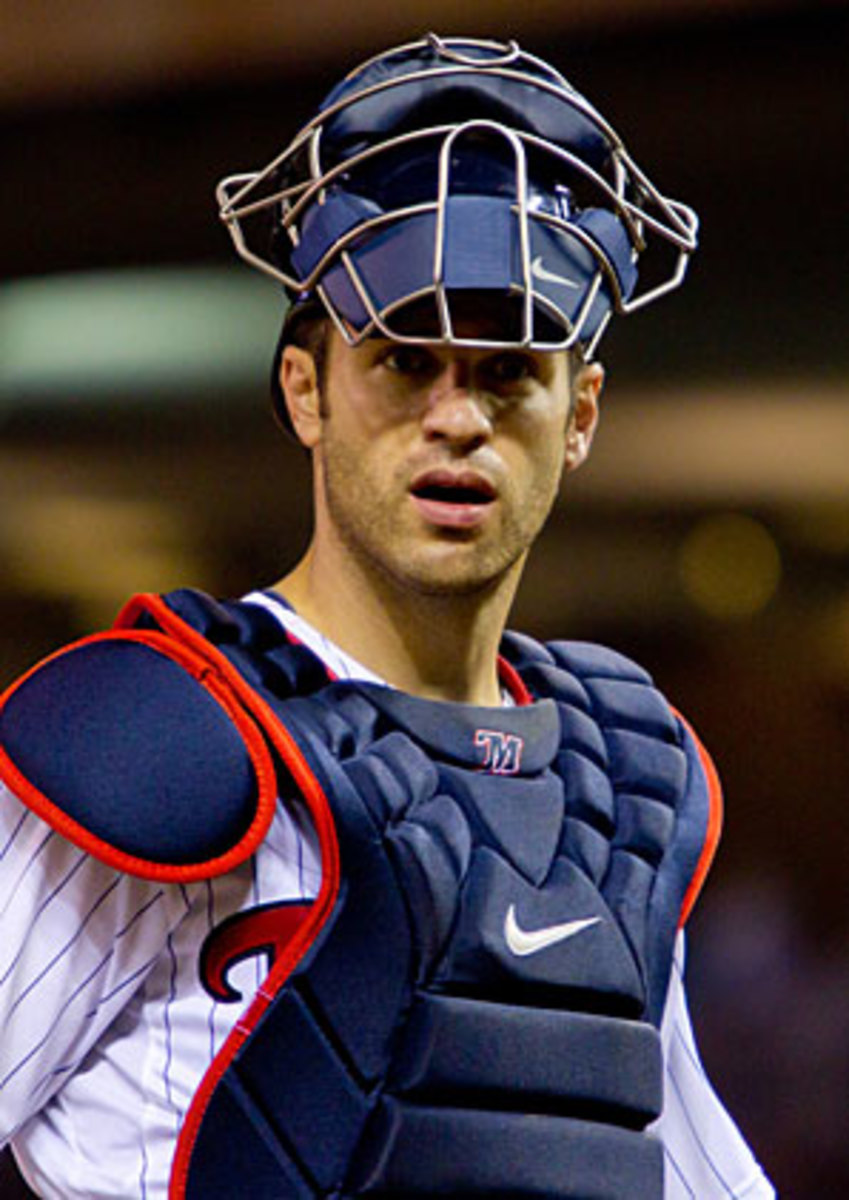Don't expect Joe Mauer to be traded

Joe Mauer's days as a catcher are numbered and that's far from the only thing that should make teams wary of acquiring him. (Icon SMI)

According to multiple reports, Twins catcher/first baseman/designated hitter Joe Mauer and the $142.5 million left on his contract have cleared waivers, making Mauer available to be traded to any of the other 29 teams prior to Friday's midnight deadline for playoff eligibility. This has led to much speculation about whether or not Mauer actually will be traded. That speculation (see item No. 4 here) is buoyed by the blockbuster waiver trade between the Red Sox and Dodgers last weekend, which saw the Dodgers acquire Adrian Gonzalez, Carl Crawford, Josh Beckett, Nick Punto and the combined $245 million left on their contracts, while simultaneously freeing the Red Sox, a team that has long coveted Mauer, from those commitments.
No one saw that deal coming, but even with that serving as a warning that anything can happen, Mauer almost certainly won't be traded. Yes, the Red Sox have a ton of payroll flexibility now, but there are better ways for them to use it than on a massive commitment to Mauer, who still has six guaranteed years remaining on his contract. Besides, the odds are good that his most valuable seasons are behind him. He’ll turn 30 next April and has started just 107 games behind the plate over the last two seasons combined, the same number that he started in 2010 alone. Mauer has also caught just 11 percent of attempting basestealers this season, a miserable figure compared to the league average of 26 percent and his own career rate of 33 percent. His days as a catcher are numbered, and while he’s an excellent hitter, he simply lacks the power to be a superstar worthy of his contract at first base or in rightfield, the only other positions he has ever played in the major leagues.
Mauer did hit 28 home runs 2009, the season in which he deservedly won the American League Most Valuable Player award, but that was an extraordinary and largely unrepeatable season. His second highest single-season home run total is 13 way back in 2006. He has eight this season; if he gets to 10 it will be just the third double-digit homer total of his career. Mauer has actually had a nice rebound this season after losing half of 2011 to injury and illness, and looks like he could probably deliver .300/.400/.450 seasons with regularity well into his 30s if he escapes the power-devouring Target Field, where he has slugged .397 and hit just four home runs in 726 career plate appearances. However, he may need to escape catching to do that as well (he has been far more productive as a catcher than a first baseman this season, but, despite being healthy, has started behind the plate in just 62 of the Twins 129 games). While .300/.400/.450 is excellent production, it is not worth $23 million (Mauer’s annual salary through 2018) when it comes from a first baseman or rightfielder.
That’s just considering Mauer’s potential value against the cost of his contract. Chances are the Twins aren’t going to let Mauer go without getting at least a respectable prospect or two in return. Minnesota would benefit from dumping his contract, but Mauer is not just any superstar. He was born and raised in St. Paul, drafted by the Twins with the first overall pick in 2001, won that 2009 AL MVP with one of the greatest catching seasons in major league history, and is not only the face of the franchise but, thanks to various endorsement deals, one of the faces of the sport. The Twins can’t trade that face without saving some face and getting a young player or two that can at the very least serve as a peace offering to their fanbase, and if the acquiring team wants the Twins to assume even a tiny portion of Mauer’s remaining deal as compensation for those young players, those prospects would need to be legitimate. Also, Mauer has a full-no trade clause that, even if he were open to a deal, could be leverage for him to receive additional compensation in exchange for approving the trade
It's extremely unlikely the Red Sox would trade key prospects for the right to pay Mauer well north of nine figures in his 30s, and there’s not another team in baseball that has the financial might and flexibility to acquire that contract given the risk involved of an aging catcher with major leg and back injuries in his recent past. What’s more, before Gonzalez and Crawford were moved in last weekend’s blockbuster, only one player in major league history had ever been traded with more than $100 million left on his contract, and that was Alex Rodriguez, who was 28 and coming off six-straight 40-homer seasons and the 2003 AL MVP award when the Yankees acquired him in February 2004. Just because the Dodgers, who are flush with new ownership and new television money, took a huge and practically unprecedented risk doesn’t mean anyone else is going to follow them off that cliff.
-- By Cliff Corcoran
